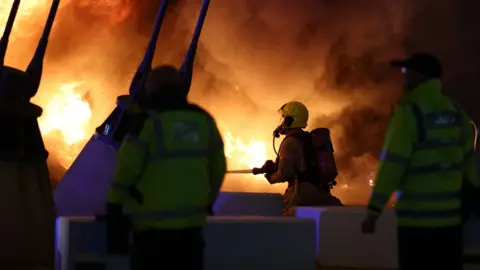ARTICLE AD BOX

 ADAM VAUGHAN/EPA-EFE/REX/Shutterstock
ADAM VAUGHAN/EPA-EFE/REX/Shutterstock
Most fire services in England are facing a shortfall in funding after the government failed to give them the same level of compensation for tax increases as the police.
The government is giving police forces an extra £230m which it says will fully cover the cost of the rise in employers' National Insurance contributions (Nics) which came into force last week.
Fire services face a similar rise in their wages bill – but the 31 that are directly funded by the government will only get top-up funds that cover 50% of the increase on average, according to BBC research.
One fire service said the 50% shortfall was the same cost as "a fully-staffed fire engine".
A spokesperson for the Ministry of Housing, Communities and Local Government (MHCLG) declined to comment on the discrepancy but did thank firefighters for their "dedication".
The government faced a backlash from business and charities after Chancellor Rachel Reeves used her first Budget to increase Nics made by employers from 13.8% to 15%.
The Treasury says it will cover the extra costs faced by government departments and public sector employers.
In February, the then minister for policing, Dame Diana Johnson, told MPs the national insurance increases would be "fully funded" in the police settlement – the annual funding agreement for forces in England and Wales.
The government also provided £502m in top-up funds for fire authorities and councils in their annual settlement grant to cover Nics rises.
But the National Fire Chiefs Council says that even with the extra money fire services will be £20m short of the £40m needed to cover national insurance increases.
The BBC contacted all 43 fire authority in England to ask how much the NICs increase is set to cost and cross-referenced that with the size of the grant they are getting to compensate for it.
The data obtained shows the average shortfall to be 50%.
It covers three quarters of the fire services in England and Wales, because 10 fire authorities do not separate out grant money from the money given to the whole county council.
But the Home Office's own estimate is that the cost of the Nics rise to all fire authorities is £40m, which also lends weight to the fire chiefs' claims of a 50% shortfall.
NFCC chair Phil Garrigan said: "Bridging this gap in funding and making sure there is sustained investment in fire and rescue will be crucial for ensuring we can continue to keep communities safe.
"What we would have reasonably expected to see is fire treated in the same way as our colleagues in the police, with the whole shortfall covered."
Biggest shortfall
Fire Brigades Union general secretary Steve Wright said fire services had already had more than a decade of cuts and the Nics shortfall was coming on top of " yet another below inflation funding settlement".
"If national insurance contributions are not covered fully by central funds, this will further eat into fire service budgets," he said.
"When compared to the police, the cost of covering the rise in national insurance contributions for the fire service is very small, so we urge the government to do the right thing and to avoid another de-facto cut."
Funding for fire services is complex because there are several different types of fire authority split into two funding models - but nearly three-quarters of fire authorities have received direct grants from the government, worth £11.9m overall.
Those direct grants were provided to 31 fire authorities - five authorities run by metro mayors and 26 combined fire authorities (CFAs), five of which have Police, Fire and Crime Commissioners (PFCCs).
The biggest shortfall was 67% in West Yorkshire, followed by 60% in Humberside, and the smallest was 17% in Essex, followed by 32% in Cumbria.
There are 10 more fire authorities where a county council runs the fire service, and Nics grants for the fire service were mixed in with the Nics top-ups for council staff, making the total for just the fire service difficult to untangle.
London and Greater Manchester also have their own structures, where the mayor has overall responsibility for Fire and Rescue services, and funding is again not separated out from Nics grants for council staff.
Budget papers from Greater Manchester Fire and Rescue Services confirmed estimates suggested they could see a 50% shortfall in funding, which "would equate to the cost of one fully-staffed fire engine".
A spokesman for Greater London Fire and Rescue Service said the mayor of London had provided an additional £2.5m top-up funding to cover the £4.4m (36%) shortfall left by the government grant.


Sign up for our Politics Essential newsletter to read top political analysis, gain insight from across the UK and stay up to speed with the big moments. It'll be delivered straight to your inbox every weekday.

 1 day ago
9
1 day ago
9








 English (US) ·
English (US) ·